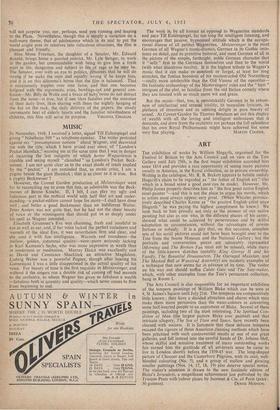CINEMA
"Bird of Paradise." (Leicester Square.)---" Dear Brat." (Plaza.) Bird of Paradise is a Hawaiian romance into which a whole heap of information on Polynesian customs and superstitions has been pushed. During the first half of this extremely lengthy Technicolor one cannot understand what it is that prevents one from taking up residence in the South Seas, where life seems one heavily-scented round of pleasure and the tax-collector never calls. In this Eden I could spend the morning slowly plaiting a little basket, humming to myself and occasionally taking a swig from a coconut, and in the afternoon I could do some stimulating surf-boarding or make a garland. The secrets of my heart I would expose to all, wearing a white flower behind my ear until I fell in love, when I would exchange it for a red, and if my love cooled and I got bored with the whole exhausting business I would let you know by wearing a modest green earpiece. None of those tiresome explanations. No compromises.
However, the second half of this picture shows us all too clearly why it is very much safer to stay in Leicester Square. Miss Debra Paget, the daughter of an island chief, has fallen in love with a visiting Frenchman, M. Louis Jourdan ; but not only are there a number of unbreakable taboos, the most frustrating of which must surely be the taboo on speaking, except with the eyes, to one's beloved, but in order to placate the gods, whO do not approve of miscegenation, Miss Paget has to walk barefoot through fire. She succeeds in doing this, thus proving the purity of her love, but the element, alas, catches up with her in the end. As a living sacrifice to the gods and to save her people she takes a stately dive into an erupting volcano. Let us stay right where we are and be thankful.
The picture is written and directed by Mr. Delmer Daves and was shot on the spot. Some of the photography is beautiful, and it is So sincerely presented that it seems considerably less foolish than most sarong symphonies. Pretty silly all the same.
You may have seen those two chronicles of family life called Dear Ruth and Dear Wife, so Dear Brat, which is their successor, will not surprise you, nor, perhaps, send you running and leaping to the Plaza. Nevertheless, though this is simply a variation on a well-worn theme, that of adolescence which in its zeal to put the world aright puts its relatives into ridiculous situations, the film is pleasant and friendly.
Miss Mona Freeman, the daughter of a Senator, Mr. Edward Arnold, brings home a paroled convict, Mr. Lyle Bettger, to work in the garden, her commendable wish being to give him a fresh start in life, dangerous and subject to fits of rage as he may be. The Senator, ever with an eye to politics, perceives that he will do wrong if he sacks the man and equally wrong if he keeps him, and it is on this dilemma's horns that the film is balanced. That it occasionally topples over into farce, and that one becomes fatigued with the arguments, cries, bawlings-out and general con- fusion—Mr. Billy de Wolfe and a brace of baby twins do not detract from the noise—is true, but if one likes families and the minutiae of their daily lives, likes sharing with them the nightly hanging of the hat on the rack, the daily delivery of the papers, the steady unromantic beat of elderly hearts and the familiar nitwittedness of
children, this film will serve its purpose. VIRGINIA GRAHAM.























































 Previous page
Previous page